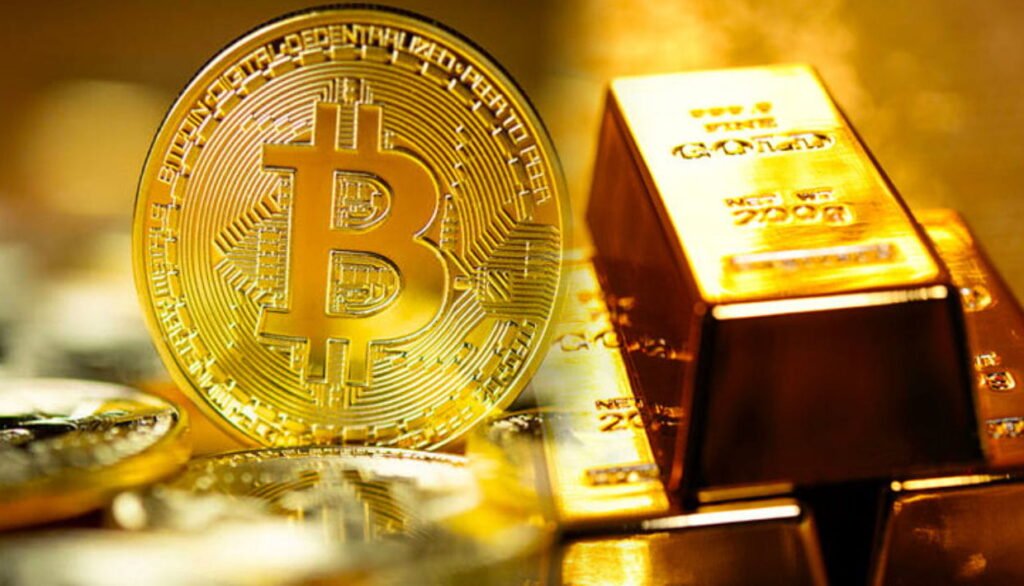Due to its rapid ascent, volatility, and potential as a gold alternative, Bitcoin has garnered attention. Bitcoin’s role as a digital store of wealth has expanded as the world faces economic turmoil. Bitcoin’s Rising Power vs. Gold against gold has transformed it from a speculative asset to a serious competitor. According to a recent study, Bitcoin’s rising tendency may outperform analyst predictions.
Bitcoin: A Digital Alternative to Gold
For years, gold has been considered a secure refuge amid economic crisis and a counterpoint against inflation. It has been valuable for millennia; investors resort to it as a wealth source when fiat currencies collapse. But in the era of digital innovation, Bitcoin is progressively recognized as a rival to gold on the financial markets.
Originally presented in 2009 by an unidentified person known as Satoshi Nakamoto, Bitcoin was once seen as a speculative digital commodity with little to no inherent worth. Early years saw significant damage to its reputation from its volatility, lack of control, and view as a tool for unlawful activity. But Bitcoin has changed with time as institutional investors, businesses, and even governments participate more actively in its evolution. Bitcoin Price is wholly digital, unlike gold, a tangible good. Operating on a blockchain and dispersed, it guarantees security and openness. It is a deflationary asset since its whole supply is limited to 21 million. By contrast, mining activities and geopolitical events, such as wars or legislative changes, can affect the supply of gold. Along with increased acceptance of blockchain technology, Bitcoin’s natural scarcity has helped it to become a reasonable store of value.
Bitcoin: A Hedge Against Inflation
Bitcoin’s Rise stems mostly from its alleged capacity to fight inflation. Many investors worry about the devaluation of conventional currencies as central banks worldwide embrace ultra-loose monetary policies, including low interest rates and widespread issuance of fiat currencies. This has spurred a movement toward alternative assets like Bitcoin, which, unlike fiat currencies, central banks, or governments, cannot control.

In several nations, particularly in light of the COVID-19 epidemic and the consequent economic upheavals, inflation rates have skyrocketed recently. Many have sought Bitcoin as a possible protection for their riches as buying power falls and living expenses grow. For both people and businesses looking for a counter against inflationary pressures, its dispersed character, restricted supply, and worldwide accessibility appeal.
Bitcoin’s Path to Higher Returns
Some analysts believe that, in the face of continuous market uncertainty, Bitcoin will generate returns well above expectations. Although Bitcoin has always been an erratic asset, the latest indicators point to increasing stability and acceptance among regular investors. Although its price has seen amazing increases recently, both retail and institutional investors are paying close attention to Bitcoin’s future development possibilities.
According to a recent analysis by a well-known financial firm, Bitcoin’s price might keep rising and maybe exceed its all-time high. Analysts believe that the rising acceptance of Bitcoin, together with expanding demand for digital assets, will drive its increase. The growing number of institutional investors including Bitcoin in their portfolios and the growing network of businesses using Bitcoin as a payment tool help to encourage this. Rising institutional acceptance is among the most important elements driving Bitcoin’s expansion. Several well-known companies, including Tesla and MicroStrategy, made large Bitcoin investments in 2020 and 2021 to indicate their conviction in the long-term viability of the asset. Moreover, financial products targeted at Bitcoin, such h ETFs, have made it simpler for investors to get acquainted with the cryptocurrency.
Factors that might drive Bitcoin’s price upward also include its increasing popularity as a method of payment and its usage in cross-border transactions, which analysts note. The value of Bitcoin may keep rising as more companies and customers accept it as a respectable form of transaction.
Bitcoin: A Growing Threat to Gold
Gold’s value is declining in the contemporary economy, despite its longtime stability. In an increasingly digital world, younger generations, more comfortable with digital currencies and online transactions, are buying less gold. Rising alternative assets like Bitcoin and other cryptocurrencies present difficulties for gold as well. Digital assets have many advantages over gold, including easier storage, better liquidity, and global transactions without intermediaries. Bitcoin’s deflationary nature—with a fixed supply of 21 million coins—makes it more appealing to inflation hedgers in a world where fiat currencies are falling.

Though still seen by many as a safe-haven asset, gold is not impervious to the changing dynamics of the world economy. Geopolitical unrest, interest rates, and consumer demand for actual gold items all affect the gold market. Bitcoin’s ascent is considered a direct challenge to gold’s hegemony in the investing scene as investors hunt out other assets more and more.
Bitcoin and Gold: Co-Existing in the Modern Economy
Though Bitcoin is showing amazing growth, it is unlikely to replace gold in the immediate future. Many investors view gold as a haven in times of trouble. Bitcoin may become increasingly more important in the financial world as it grows and becomes a digital store of value.
Gold and Bitcoin will likely coexist in a diverse financial portfolio. Even if Bitcoin becomes a hedge against inflation and a fiat currency alternative, gold will likely remain an important asset for people seeking protection in times of geopolitical or economic crisis. Bitcoin’s ability to outperform projections depends on market mood, government policy, and blockchain technology adoption. As digital assets grow, Bitcoin is becoming an investment rival to gold.
Bitcoin: A Rising Rival to Gold
The fact that Bitcoin is becoming a rival of gold is evidence of how the financial markets are changing. Bitcoin is demonstrating that it may be a good substitute for conventional assets like gold as institutional usage rises and more people look for different methods to guard their wealth. Although more traditional repositories of value compete with Bitcoin, many analysts are hopeful about its future given higher-than-expected returns. Though it remains to be seen if Bitcoin will totally replace gold, one thing is certain: its position in the global financial system is safe, a nd its impact will only keep increasing.

